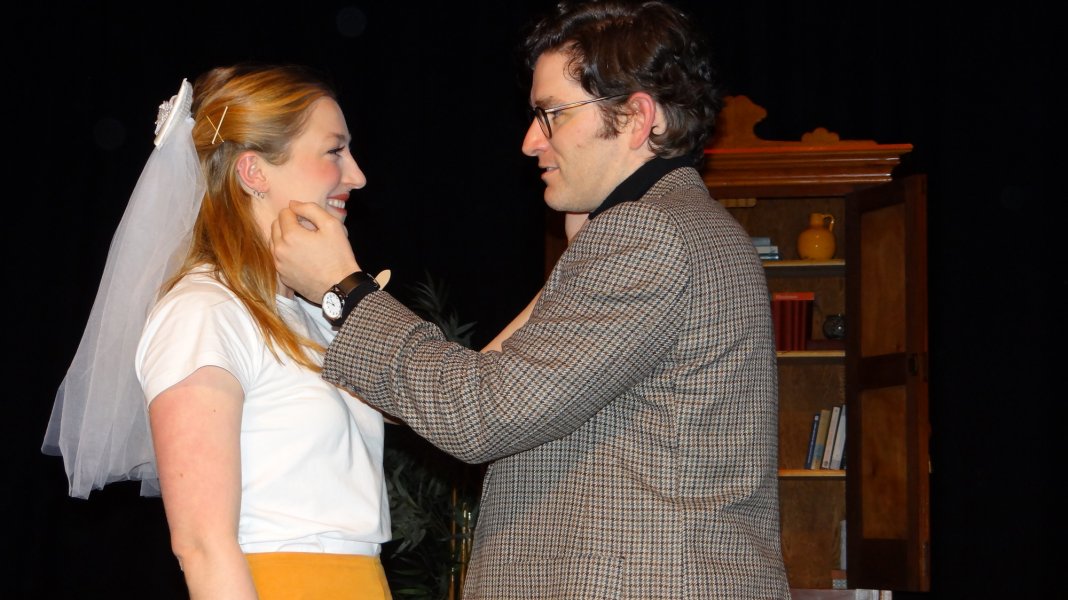By Ian Nott
The abundant intrigue with this new play by Mark Andrew is immediately found in its inventive title, The Critical Marriage, a play produced by the team at Melbourne Writers’ Theatre at Gasworks Theatre. The main character (aged Imogen), played effortlessly by Janet Watson Kruse, gives her definition of a critical marriage very early in the piece with her direct address to the audience. She is happy to tell us that her marriage was not a polarizing, intellectual battle ground between herself and husband Bernhard (John Bolger), both of whom are highly reputable academics, but a coming together of minds even when there was strong disagreement. A key to a good marriage?
But the play reveals itself to be more that a take on marriage and becomes more than just this definition from Imogen. The play delves into very philosophical terrain exploring to what extent is there binary opposition between Science and Faith. The play riffs on vast intellectual themes to do with academia versus concrete real-life living. What is it to be human? What do we do when there is demands put upon us in life or when we carry emotions, such as guilt, that reduces our capacity to thrive?
Through his excellent writing, Andrew covers these ideas plus more in a mere 60 minutes. It is precise and evocative writing that encourages the audience to really think. There light and delightful moments but overall this play asks the audience to deeply contemplate relationships and the purpose of human existence. It reminded me a little of Charles Dickens’ novel Hard Times – heart versus the head, the rational versus the emotional. It is a great feat the Andrew’s explores such vast territory in just 60 minutes.
The narrative is of a marriage based on intellectual freedom but how this freedom does come at a cost. Young Imogen (Eleanor MacIntyre ) chases Young Bernhard (Ian Ferrington) at the end of one of his lectures. They fall in love and live in Berlin a live inside the world of academia for many decades. The set depicts the Englishman in Berlin feel, with quintessential set pieces that represent an Oxbridge aesthetic. We are then introduced to Bernhard’s mother, Mutti (Carrie Moczynksi), who resides in an aged care home needing constant care. It is here that the scenes between aged Bernhard and Mutti begin to really explore the theme of human condition and how our past mistakes continue to haunt us.
Watson Kruse is excellent as aged Imogen. Her character is performed like a wise owl but with a brilliant English rose demeanour. It is a beautiful rendering of a person with enormous mental capacity who struggles to live a contented life and who is challenged by her husband’s decisions.

Unfortunately, the actor who was to play aged Bernhard had to leave the cast four days before opening due to family reason. It was John Bolger who stepped in with script in hand just in time for this Preview night.
Ferrington and MacIntyre both played numerous roles to great effect, especially their young Imogen and Bernhard. They depicted two characters in the throes of passion with their lives ahead of them. Overall, the acting from the ensemble was first rate.
Karyn Hodgkinson’s directing was seamless. The back and forth from present to the past action was cleverly directed. A strong emotional sensibility was created on stage and the actors played the parts in such an understated and genuine way.
Andrew won the Amethyst award for this year, another creative venture at the Melbourne Writers’ Theatre that creates and supports new Australian writing.
The beauty of this play is that it sends you blissfully adrift to contemplate the triumphs and foibles of what it is to be human.





